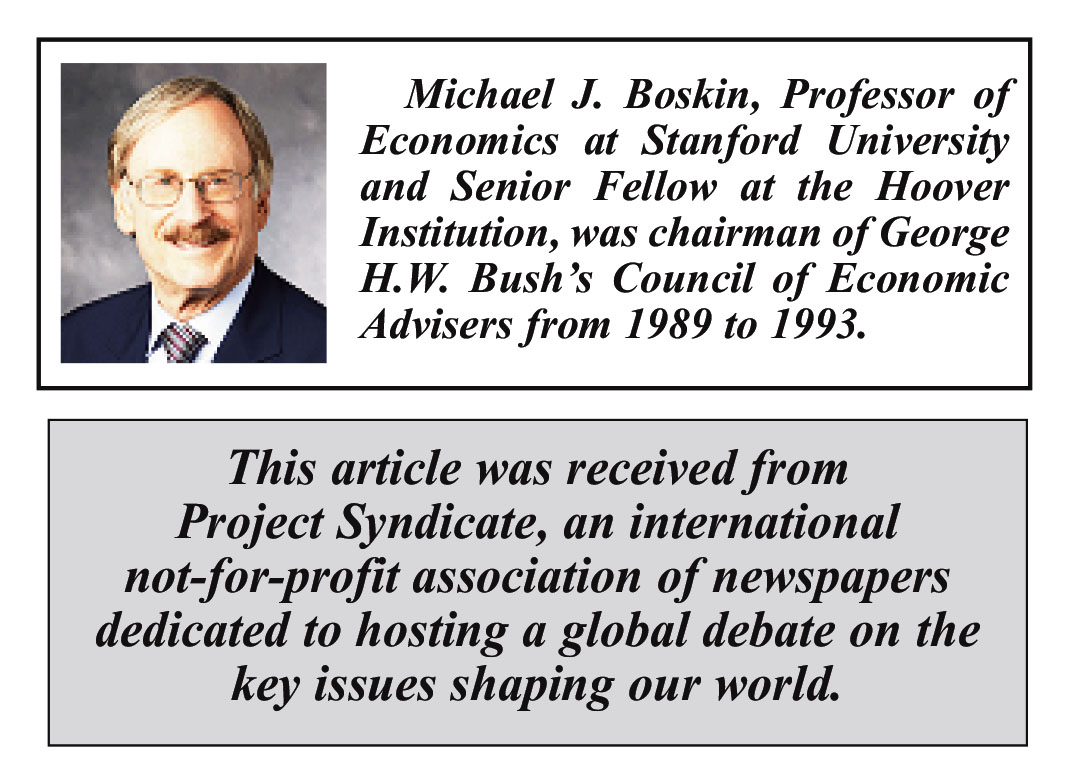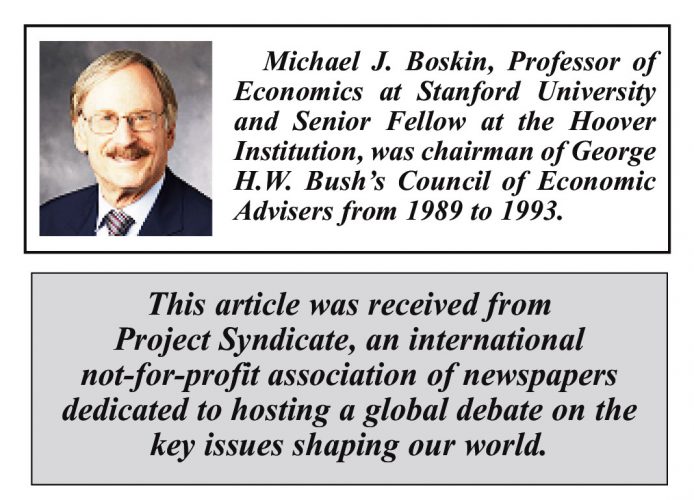STANFORD – The year 2023 will be remembered for many significant economic, political, and technological developments. But one of the most noteworthy is something that did not happen: a recession in the United States. While parts of Europe flirted with recession, and China stumbled after lifting its “zero-COVID” restrictions, the US labor market and American consumers proved quite resilient.
That came as no surprise to me. In the summer of 2021, I predicted that President Joe Biden’s so-called American Rescue Plan – an unnecessary $1.9 trillion package of cash payments and subsidies that was three times the estimated output gap over the next two years – would cause a bout of high inflation. In response, the Federal Reserve would have to raise its target interest rate, and the economy would duly slow.
Still, I was not among the majority claiming that a recession was imminent. Instead, I thought there was a good chance of a soft landing (a falling inflation rate in the absence of higher unemployment), because all the recent difficulties in hiring and retaining workers would prompt many firms to hoard labor.
But the US is not out of the woods yet. There are some obvious signs of weakness, such as in commercial real estate, and though inflation is trending down, the core personal consumption expenditures (PCE) index, which excludes volatile food and energy prices, was still up 3.5% year on year in October – well above the Fed’s 2% target.
Moreover, the cruel cumulative impact of inflation has left many household budgets strained, which helps to explain why Biden is trailing former President Donald Trump in opinion polls ahead of the 2024 election. Many other issues – from soaring property crime, massive illegal immigration, and the overturning of Roe v. Wade, to Trump’s four criminal indictments and questions about Biden’s role in his son’s influence-peddling scandal – have contributed to the electorate’s generally sour mood.
Ten years ago, nobody would have predicted a major ground war in Europe. Despite Ukraine’s recent success in clearing the Black Sea of Russian naval threats, the conflict on the ground is stalemated, with no end in sight. Fortunately, the global energy market supplied liquefied natural gas (LNG) to Europe faster than predicted. Those shipments, combined with a mercifully warm winter, spared most of the continent from severe hardship in decoupling from Russian energy. It is yet another example of the benefits that markets offer when they are allowed to function.
Meanwhile, Hamas’s barbaric terrorist attack on Israel exposed the world to a shocking level of depraved cruelty, including rapes and beheadings of civilians in their homes. Worse, Israel’s response, given the civilian casualties and extreme hardship in Gaza, has led to a surge of pro-Hamas sentiment on US college campuses, where many are calling for the elimination of the state of Israel and, at least implicitly, genocide against Jews. In a recent YouGov/Economist poll, one in five Americans aged 18 to 29 described the Holocaust as a “myth.”
Most Americans are shocked and dismayed at university presidents’ feeble response to campus anti-Semitism. But they should not be surprised. It is yet another manifestation of the woke “progressive” ideology that has been allowed to metastasize through elite universities. As a result, every issue is subjected to the simple-minded framing of “oppressors versus the oppressed.” Hierarchies of “intersectional” victimhood and fatuously inaccurate history are routinely used to justify abhorrent behavior by select groups.
We are all now familiar with trigger warnings, safe spaces, the obsession with pronouns, and cancel culture, all of which have crowded out common sense, universal respect for all people, objectivity, and honest inquiry. Calls for “equity,” “inclusion,” and “justice” on campus and in many corporations were never extended to Jews – who constitute 2.5% of the US population while suffering 63% of hate crimes involving religion – or to Asians. No wonder higher education is facing a crisis of confidence and calls for defunding.
Also vying for the most important development of 2023 is the explosion of generative artificial intelligence. AI has been used in a variety of applications for years, but rapid improvements and fears that it will displace humans have left governments scrambling to create sensible rules. Maximizing the benefits and mitigating harm will not be easy, especially given China’s own rapid AI advances.
Finally, America lost two giants toward the end of the year. I was privileged to call both former US Secretary of State Henry Kissinger and former US Supreme Court Justice Sandra Day O’Connor friends. Like his close friend, former Secretary of State George Shultz, Kissinger died shortly after his 100th birthday. He was best known for playing the “China card” to drive a wedge in the Sino-Soviet relationship; ending the Vietnam War, for which he won the Nobel Peace Prize; and managing Cold War relations with the Soviet Union.
Kissinger’s “balance-of-power” realpolitik certainly had its detractors, especially owing to civilian causalities in Cambodia, Vietnam, and East Timor. But history will mark him (along with Shultz) among America’s greatest diplomats – together with Dean Acheson, George Kennan, and George Marshall, who helped President Harry Truman establish the post-World War II economic and security commons.
O’Connor, the first female justice, was pragmatic, conservative, humble, charming, and tough, but never mean. Had she been a liberal Democrat, more statues and public infrastructure would bear her name. As the swing vote on the Court for decades, she often rejected absolutist positions on hot-button issues such as abortion and affirmative action and fashioned compromises that a large majority of Americans could accept.
Both continued to contribute their remarkable talents long after government service. While Kissinger advised world leaders and wrote influential books at a pace that would stun even the most prolific younger author, O’Connor promoted the civics education that has been dangerously disappearing from K-12 (and college) education curricula. We can only hope a new generation of thinkers and doers of their caliber will soon emerge to help guide a fractious nation through turbulent times.
Copyright: Project Syndicate, 2023.




